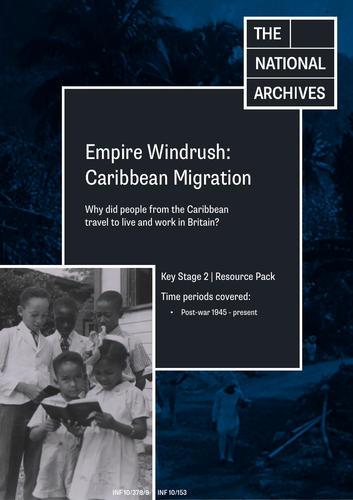

Why did people from the Caribbean travel to live and work in Britain?
When the Second World War ended, countries needed to recover and rebuild.
By 1948, the Nationality Act was passed which gave people from British colonies the right to live and work in Britain if they wanted. They were citizens of the United Kingdom and Colonies. Many Caribbean men and women had served in the forces during the war, some wanted to re-enlist into the armed forces or find other employment. After the war, Britain needed people to fill jobs in the health service, transport system and postal system.
The arrival of the ship ‘Empire Windrush’ is often seen as the start of this migration of Caribbean migrants from countries including Jamaica; Bermuda; Trinidad and British Guiana seeking jobs and a better life in this country. Jamaica for example, had high unemployment and a recent hurricane had caused huge damage. However, it is also important to remember that there were earlier lesser-known ships that carried post-war migrants from the Caribbean. Find out these other ships in this National Archives blog.
It cost £28 for travel on the troop-deck and £48 for cabin class travel on the Empire Windrush. The ship picked up passengers at Trinidad, Jamaica (Kingston), Mexico (Tampico), Cuba (Havana) and, finally Bermuda before arriving at Tilbury Docks on 22nd June in Britain. The total number of passengers was 492, of which 52 were volunteers for the armed forces, 236 who had nowhere to go and who were accommodated in London’s Clapham South tube station deep shelter and 204 who had places to go to and were dispersed direct from Tilbury.
The Ministry of Labour set up a small labour exchange or job centre in the Clapham South shelter to help to place people in jobs. Fares were paid to those travelling to other parts of the country.
Life was difficult for many people after the war. Rationing and shortages continued, people still queued for food. People therefore arriving from the Caribbean would have experienced this as well as leaving friends and family behind. The climate was also colder and wetter. Unfortunately, some Caribbean migrants were made to feel unwelcome and treated unfairly and differently because of racism. Finding jobs and somewhere to live was difficult due to discrimination. Many were forced to accept employment with low wages or poor housing.
Something went wrong, please try again later.
We are pleased to let you know that your resource Empire Windrush: Caribbean migration, has been hand-picked by the Tes resources content team to be featured in https://www.tes.com/teaching-resources/blog/windrush-day in June 2024 on https://www.tes.com/teaching-resources/blog. Congratulations on your resource being chosen and thank you for your ongoing contributions to the Tes Resources marketplace.
Report this resourceto let us know if it violates our terms and conditions.
Our customer service team will review your report and will be in touch.